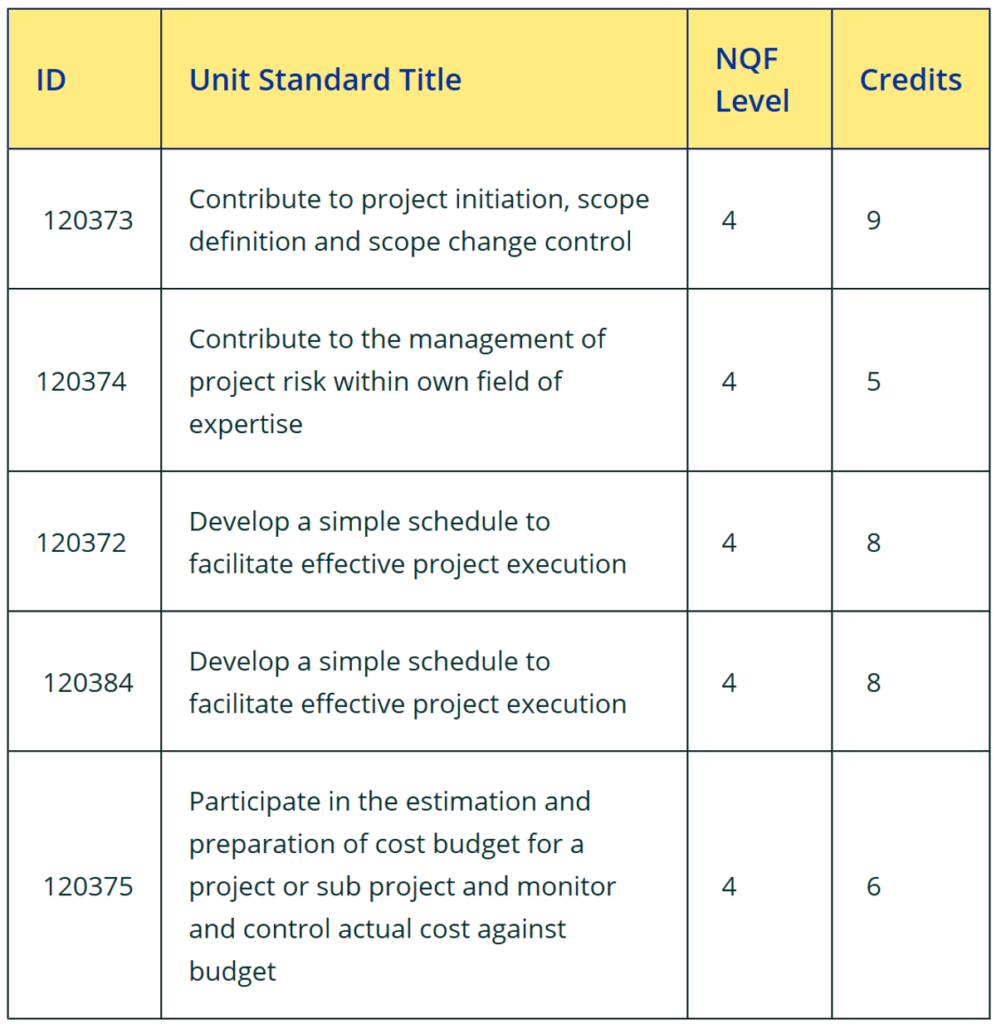Duration: 3 Days
Who should attend: Project Managers and Team Leaders
Supervisors, Managers and Department Heads
Anyone who wants to manage projects from start to finish with greater effectiveness and efficiency
SAQA Alignment: The course is aligned to the following unit standards:

Duration: 3 Days
Who should attend: Project Managers and Team Leaders
Supervisors, Managers and Department Heads
Anyone who wants to manage projects from start to finish with greater effectiveness and efficiency
SAQA Alignment: The course is aligned to the following unit standards:
Overview
This 3 day course will help you to deliver smarter project solutions …with higher quality, greater value and better accountability. You’ll cover everything, from defining scope and gathering requirements…to planning and budgeting…to utilizing scheduling and control tools.
Our approach is to keep it practical and simple! Participants will:
- Be actively involved…..
- Immediately apply the tools and techniques to workplace projects and issues.
- Participate in team building workshops using proven tools and techniques that can be applied to any project.
The seminar is designed for companies seeking to implement effective, profitable and practical skills so you can confidentially face and conquer even the toughest challenges.
This workshop provides a common language between individuals at the implementation level – marketing, sales, project management, engineering, manufacturing or construction, test and assembly, shipping, installation as well as executive leadership. This Project Management seminar will ensure all members of the team are on the same page.
Benefits
- Set practical goals for your projects-goals you can meet, regardless of “hitches”
- Set realistic schedules that are right on target
- Develop a project plan-and get that plan implemented
- Stay on top of schedules, workloads and “people problems”
- Break down a project into smaller, less intimidating tasks
- Save time and energy by “building in flexibility” rather than “putting out fires”
- Cope with squeezed budgets and stolen time
- Delegate in a fair and practical way within the project team
- Build your credibility with top management
Outline: Smarter Project Management
Duration: 3 Days
Concepts of Project Management
- Benefits of project management
- Characteristics of a well-defined project
- Project tasks and the path they follow
Scope Definition and Project Requirements
Defining scope in terms of business, technical, operational objectives
Time-cost-scope tradeoffs and negotiations
Gathering and documenting requirements
Critical success factors and measures: project metrics
Project risk management
The Project Requirements Document as a decision-making tool
Create the Project Charter
Write the Project Charter
Consider the Project Charter’s purpose
Write a Statement of Work
Review a SOW
Using a SOW
Creating a SOW for internal projects
Managing the Project Team
Defining scope in terms of business, technical, operational objectives
Recruiting Team Members
Working with assigned team members
Negotiate for resources
Consider the Organizational Structure
Identify leadership skills
Implementing team building tactics
Working through team issues
Managing versus leading
Identifying team development
Work with global teams
Identify team roles and responsibilities
Analyze the resources and talents to completion
Project Leadership
The central role of effective communicationsl
The project manager as motivator and problem-solver
Work Breakdown Structure (WBS) and Its Detailed Work Packages
Matching project objectives and methodology
Using guides and templates, checklists and appropriate standards
WBS: a planning, scheduling, staffing, budgeting and control tool
Project Scheduling: Network Logic and Dependency Analysis
The structure, functions, format and conventions of a logic network
How to construct a network diagram, precedence diagramming, arrow diagramming
Defining the project’s critical path, free float and total float
Project Scheduling: Estimating the Work
Creating realistic and achievable estimates
Defining estimates…types of estimates
Targets vs. estimates vs. commitments
Project Costing
Costing an element of work
Cost Estimating in Practice
Preparing Project Budgets
Basic Accounting for the Project Manager
Project Risk
Consider the risk-reward principle
Use Qualitative Analysis
Use Quantitative Analysis
Create Risk Impact Statements
Assign Risk Owners
Create Risk Triggers
The Integrated Project Plan
Project schedule displayed as Gantt Chart, network diagram or spreadsheet
Project resource utilization, cost or budget and milestone plans
Project Control and Reporting
Five sources of change to project scope
How to conduct a net impact assessment
Determining variances from the approved plan…the change control board
Earned value overview
Reporting project status and formats
Project Closure
Preparing a useful and brief final report
Documenting lessons learned
Securing final approvals and buy-ins
Organizational, contractual and financial closures
